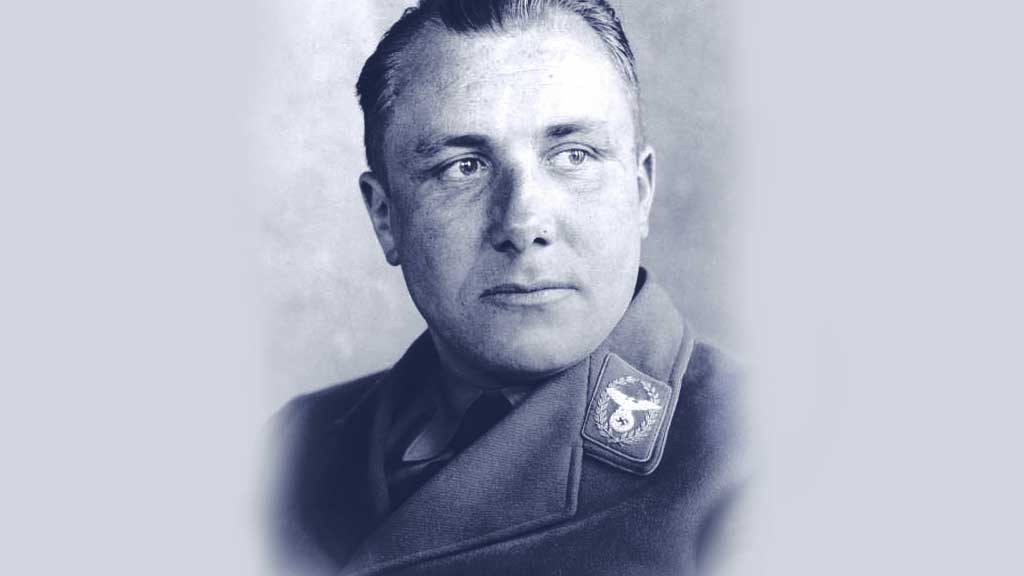Gehlen’s memoirs are an interesting read and a remarkable view behind the scenes of the eastern front and the fully idiot decisions imposed by politicians (read Hitler), overruling the best military strategies. But don’t expect dangerous revelations. Although there’s an intriguing claim that Martin Bormann, chief of the Nazi party organization, was a Soviet spy personally protected by Hitler. Also a remarkable statement is that in 1939 the German and Prussian army was not yet fully prepared for a new war due to lack of sufficient weapons, munition and soldiers, this was also stated by the Prussian high command. This was a known fact, by all players …
Gehlen writes about Bormann and Hitler in his memoirs (Der Dienst – Errinerungen):
By this time, I had come to the conclusion that the Russians had an excellently informed source working for them in the German supreme command. Canaris and I repeatedly observed quite independently of one another that the enemy was receiving rapid and detailed information on incidents and top-level decisions making on German side. Admiral Canaris came to my headquarters at Angerburg one day and in the course of a lengthy conversation indicated whom he suspected to be the traitor, although I believe that, even so, he knew more than he told me.
It was a personality about whom I had had my own doubts for some time. The secret was carefully preserved by the Russians, both then and afterward, and I fully believed it myself only years after the war, when I came into possession of certain information as head of the Gehlen organization in West Germany.
Canaris
What Canaris told me concerned the fateful role in which Hitler’s closest confidant, Martin Bormann, was cast in the last war years and in the postwar epoch too. Bormann, who had been Hitler’s personal secretary since 1943, and chief of the Nazi party organization ever since Rudolf Hess’s flight to Scotland in May 1941, was Moscow’s most prominent informant and adviser from the very moment the campaign against Russia started.
There is no foundation whatever for the allegations which have been made from time to time to the effect that Bormann is alive and well, living in the impenetrable jungle between Paraguay and Argentina, surrounded by heavily armed bodyguards. He crossed to the Russians in May 1945 and was taken back to the Soviet Union.
At the time, I believe, Canaris lacked proof. Our suspicions were largely confirmed when, independently of one another, we found out that Bormann and his group were operating an unsupervised radio transmitter network and using it to send coded messages to Moscow.
When the OKW monitors reported this, Canaris demanded an investigation; but word came back that Hitler himself had emphatically forbidden any intervention: he had been informed in advance by Bormann of these Funkspiele, or fake radio messages, he said, and he approved them. This was the sum of our knowledge at the end of the war. Canaris and I both realized it was out of the question to put watchdogs on Bormann, the most powerful man next to Hitler in the Nazi hierarchy.
And neither of us was in any position to denounce the Reichsleiter with any prospect of success. The disdain Hitler had shown for my own intelligence summaries, however right they had later proven, was one factor, and the increasingly exposed position of Canaris and the Abwehr was another.
Blackmail?
The smallest slip would have put an end to our investigations, and probably to us as well. Canaris described to me his grounds for suspecting Bormann and told me what he assumed to be the reasons for his treachery. He would not exclude the possibility that Bormann was being blackmailed, but he was inclined to see the real motives in the Reichleiter’s immense and insatiable ambition – he was tortured by complexes toward the milieu in which he found himself, and driven by ambition to succeed Hitler when the day came.
We know of course how cunningly Bormann succeeded in bringing first Goering and then Goebbels into discredit with Hitler, for they were his great rivals.
It was not until after 1946, when I headed my own intelligence organization, that I had an opportunity to look into Bormann’s mysterious escape from Hitler’s Berlin bunker and his subsequent disappearance. Some time later I received conclusive proof of Bormann’s postwar movements. During the 1950s I was passed two seperate reports from behind the Iron Curtain to the effect that Bormann had been a Soviet agent and had lived after the war in the Soviet Union under perfect cover as an adviser to the Moscow governement, and has died in the meantime.
Original German:
In einem längeren Gespräch kamen Canaris und ich zu der Uberzeugung, daß die Sowjets in der deutschen obersten Führung über eine gut orientierte Nachrichtenquelle verfügen mußten. Wiederholt stellten wir unabhängig voneinander fest, daß der Feind in kürzester Zeit über Vorgänge und Erwägungen, die auf deutscher Seite an der Spitze angestellt wurden, bis ins einzelne unterrichtet war.
Ich will an dieser Stelle mein langes Schweigen um ein Geheimnis brechen, das von sowjetischer Seite aufs sorgfältigste gehütet — den Schlüssel zu einem der rätselhaftesten Fälle unseres Jahrhunderts in sich birgt. Es ist die verhängnisvolle Rolle, die Hitlers engster Vertrauter, Martin Bormann, in den letzten Kriegsjahren und danach gespielt hat.
Als prominentester Informant und Berater der Sowjets arbeitete er für den Gegner schon zu Beginn des Rußlandfeldzuges. Unabhängig voneinander ermittelten wir die Tatsache, daß Bormann über die einzige unkontrollierte Funkstation verfügte. Wir waren uns aber darüber einig, daß ein gezielter Ansatz zur Uberwachung des neben Hitler mächtigsten Mannes in der nationalsozialistischen Hierarchie zu diesem Zeitpunkt so gut wie aus geschlossen war.
Jede Unvorsichtigkeit hätte das Ende der Nachforschungen und auch unser Ende bedeutet Canaris hat mir seine Verdachtsmomente, Vermutungen und Feststellungen über die Motive der Verrätertätigkeit Bormanns geschildert.
Er schloß Möglichkeiten zur Erpressung Bormanns nicht aus, sah aber die wahrscheinlichen Beweggründe eher in den von maßlosem Ehrgeiz und Komplexen gegenüber seiner Umgehung begründeten und letztlich nicht befriedigten Ambitionen des Reichsleiters, eines Tages Hitlers Position einzunehmen. Wie geschickt Bormann seine großen Rivalen Göring und Goebbels abwechselnd bei Hitler in Mißkredit brachte, ist uns inzwischen bekannt.
Meine eigenen Feststellungen konnten erst einsetzen, als nach 1946 für mich Möglichkeiten bestanden, die mysteriösen Umstände der Flucht Bormanns aus Hitlers Bunker in Berlin und sein Verschwinden zu untersuchen. Die wiederholt in der internationalen Presse aufgetauchten Behauptungen, Bormann lebe im undurchdringlichen Urwaldgebiet zwischen Paraguay und Argentinien, umgeben von schwerbewaffneten Leibwächtern, entbehren jeder Grundlage.
Zwei zuverlässige Informationen gaben mir in den 50er Jahren die Gewißheit, daß Martin Bormann perfekt abgeschirmt in der Sowjetunion lebte. Der ehemalige Reichsleiter war bei der Besetzung Berlins durch die Rote Armee zu den Sowjets übergetreten und ist inzwischen in Rußland gestorben.
-Gehlen 1971, Der Dienst p.47-



